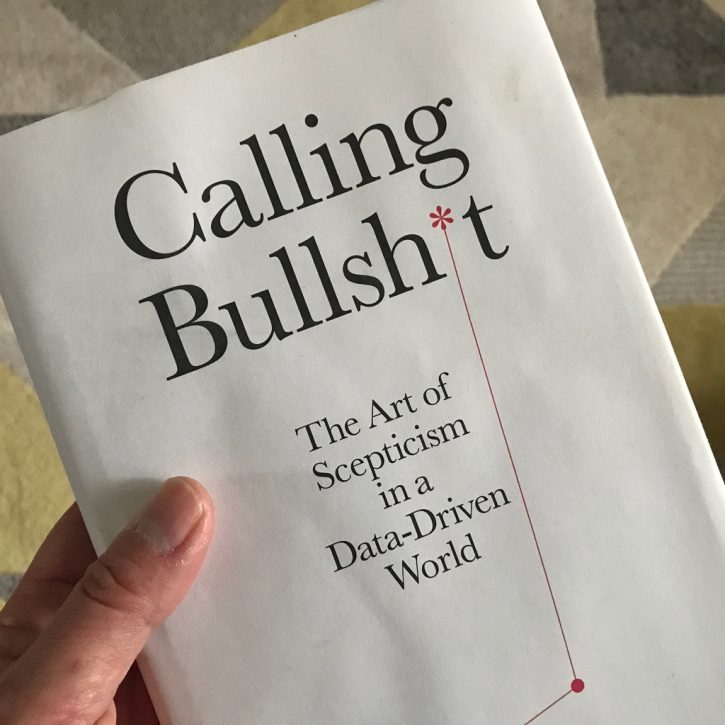The Hall of Einar Sunday Recommendation #29
Hello and welcome to my Sunday Recommendation. Thanks for joining me. Every week I read great wildlife and nature books, stumble upon engrossing websites and hear wonderful new music. This is my chance to bring you carefully curated recommendations of all the best I’ve experienced – every Sunday. If it’s folk, or independent, or about wildlife, nature or Orkney, I may love it, and so may you.
If you’re going to explore the modern world, one of the most important tools in your adventure kitbag is scepticism of numbers. Whether it’s Brexit or the pandemic, the media and social media are as full of figures as they are of words. How do you make sense of it all? Calling Bullsh*t is a good place to start.
Carl T Bergstrom is a professor of theoretical and evolutionary biology. Jevin West is an expert in misinformation (or at least that’s what he says) and an Associate Professor. They both work at the University of Washington in Seattle. Their focus in Calling Bullsh*t is often on science but also on popular culture. It’s like a 300 page course on the dangers of misinformation and ends with a practical toolkit to counter and refute misinformation.

The problem the book identifies is that “Producing bullshit is a lot less work than cleaning it up”. Producers are so profligate with their effluent that each piece of misinformation has been circulated, reformatted, repeated and embedded many times before a counter-argument or question can be raised. Reading it made me even more convinced that professional journalists should have to read this and preferably do a course as well. Much of the media seems obsessed with setting up entertaining arguments between purveyors of half-truths and lies rather than searching for the truth. Brandolini’s Principle is: “The amount of energy needed to refute bullshit is an order of magnitude bigger than that needed to produce it.” Perhaps the reason why the media is so resigned to entertainment rather than the truth is that exposing the truth is very, very hard work. Then there’s Fanelli’s Principle; “an idiot can create more bullshit than you could ever hope to refute”. We need books like this. We need many, many more books like this.
Calling Bullsh*t has fascinating examples on every page, many of which are worked through and explained well. It’s firmly embedded in American culture, so you may need a familiarity with American culture, which can be a bit discombobulating if you’re British. I got used to it as I read on. If you watch US TV shows you’ll find it all very familiar. It’s an entertaining read and full of great quotes and nuggets of information on every page. I found myself taking notes.
I enjoyed finding the word paltering defined within; lying by telling the truth. Telling the truth with a different or ambiguous meaning to deliberately mislead is, to me, the definition of political speech. Perhaps the most famous example is Bill Clinton’s “I did not have sex with that woman.” *
As Carl and Jevin are both scientists they are rigorous with their sources (no bullish*t allowed) and the book has a serious bibliography and index. It’s reassuringly well researched. However, it doesn’t cover that some people want bullshit and invite you to provide it. I arrived half an hour late for an important board meeting and was asked repeatedly “Was the traffic bad?” to which I replied, “No, I just set off late.”
I enjoyed finding Goodhart’s Law; “When a measure becomes a target, it ceases to be a good measure”. That applies to the NHS target culture so incredibly well. Insisting that all people who attend A&E should be seen within four hours means that people who need to be seen immediately have to wait until the four hours is nearly up so that people with minor complaints can be seen within the limit as well. Care gets worse the more you set targets to improve it. A strength of Calling Bullsh*t is that it could have been many, many different books, each with a different context. The examples are almost irrelevant when it’s the principles which are vital, such as don’t confuse association with causation; just because two things happen together doesn’t mean one caused the other.
I’ve never been a fan of Artificial Intelligence as currently it’s just computers doing what largely white male programmers have told them to do. AI systems can be sexist and racist. Calling Bullsh*t shows they’re also often falsely intelligent at doing the right thing for the wrong reason: Machine learning identified people who had pneumonia from x-rays better than people did. Unfortunately that’s because some x-rays had the word ‘portable’ on them. The more sick the patients were, the more likely they were to have their x-rays taken with a portable x-ray machine. It was a child-like ability to see the obvious clue rather than a deep and subtle understanding which caused their good performance. The authors make the case for algorithmic accountability; if you’re going to make an AI system, then people affected by the algorithm should have the right to know why algorithms make the choices they do. Trade secrets mean commercial firms fail at that every time.
Carl and Jevin seem friendly, enthusiastic and profoundly moral. They’re also not averse to identifying their own mistakes. It’s a great read.
Science is humanity’s greatest invention. Very few of our leaders are trained in it. Many journalists didn’t study it. The population as a whole doesn’t understand it well enough. This book goes a small way to address that. I wish more people would read it.
That’s it for this week. I’ll be back with more recommendations of things you might adore next Sunday. In the meantime, I wish you a great week. Keep safe, everyone.
*He did, just not that kind of sex.
More Sunday Recommendations
 The Hall of Einar Sunday Recommendation #49 Hello and welcome to my Sunday Recommendation. Thanks for joining me. Every week I read great wildlife and nature books,… read more
The Hall of Einar Sunday Recommendation #49 Hello and welcome to my Sunday Recommendation. Thanks for joining me. Every week I read great wildlife and nature books,… read more The Hall of Einar Sunday Recommendation #48 Hello and welcome to my Sunday Recommendation. Thanks for joining me. Every week I read great wildlife and nature books,… read more
The Hall of Einar Sunday Recommendation #48 Hello and welcome to my Sunday Recommendation. Thanks for joining me. Every week I read great wildlife and nature books,… read more The Hall of Einar Sunday Recommendation #47 Hello and welcome to my Sunday Recommendation. Thanks for joining me. Every week I read great wildlife and nature books,… read more
The Hall of Einar Sunday Recommendation #47 Hello and welcome to my Sunday Recommendation. Thanks for joining me. Every week I read great wildlife and nature books,… read more The Hall of Einar Sunday Recommendation #46 Hello and welcome to my Sunday Recommendation. Thanks for joining me. Every week I read great wildlife and nature books,… read more
The Hall of Einar Sunday Recommendation #46 Hello and welcome to my Sunday Recommendation. Thanks for joining me. Every week I read great wildlife and nature books,… read more The Hall of Einar Sunday Recommendation #45 Hello and welcome to my Sunday Recommendation. Thanks for joining me. Every week I read great wildlife and nature books,… read more
The Hall of Einar Sunday Recommendation #45 Hello and welcome to my Sunday Recommendation. Thanks for joining me. Every week I read great wildlife and nature books,… read more The Hall of Einar Sunday Recommendation #44 Hello and welcome to my Sunday Recommendation. Thanks for joining me. Every week I read great wildlife and nature books,… read more
The Hall of Einar Sunday Recommendation #44 Hello and welcome to my Sunday Recommendation. Thanks for joining me. Every week I read great wildlife and nature books,… read more The Hall of Einar Sunday Recommendation #43 Hello and welcome to my Sunday Recommendation. Thanks for joining me. Every week I read great wildlife and nature books,… read more
The Hall of Einar Sunday Recommendation #43 Hello and welcome to my Sunday Recommendation. Thanks for joining me. Every week I read great wildlife and nature books,… read more The Hall of Einar Sunday Recommendation #42 Hello and welcome to my Sunday Recommendation. Thanks for joining me. Every week I read great wildlife and nature books,… read more
The Hall of Einar Sunday Recommendation #42 Hello and welcome to my Sunday Recommendation. Thanks for joining me. Every week I read great wildlife and nature books,… read more